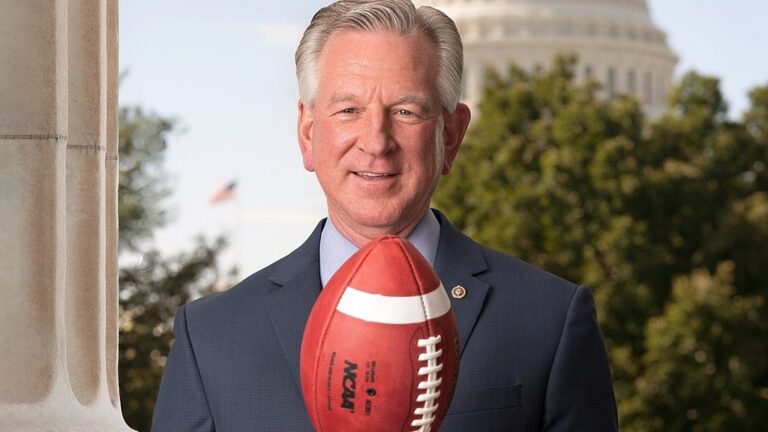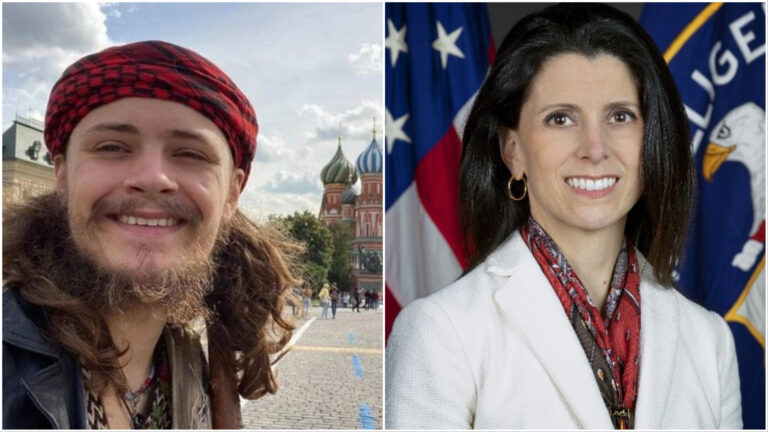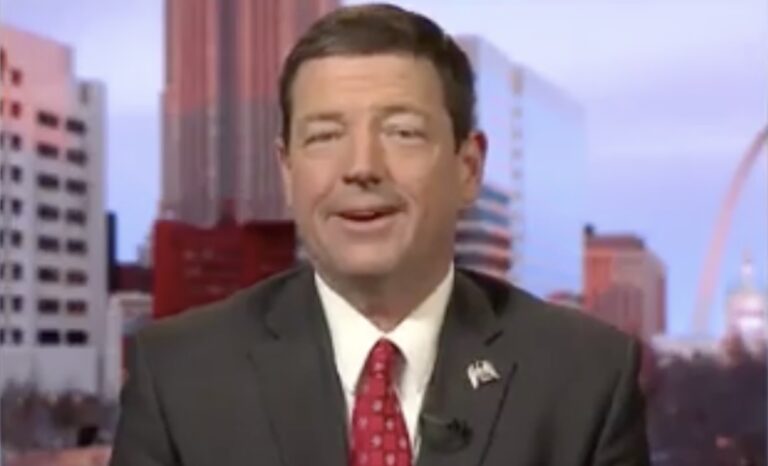Democrat News
Report: Tuberville Running For Governor Of Alabama In 2026
This post was originally published on this site
The Senate’s dumbest Senator looks to be leaving in 2026. Should Tuberville win the Republican nomination he’ll likely coast to an easy election win as Alabama hasn’t had a Democratic Governor in decades.
Source: Yellowhammer News
U.S. Senator Tommy Tuberville (R-Auburn) is running for Governor of Alabama in 2026, according to reports confirmed by Yellowhammer News.
Back in state while Congress is in recess, Tuberville told a group of donors at a private event on Wednesday night that his mind is officially made up. Rather than seeking re-election to the U.S. Senate, he is ready to run his next race in Alabama, and serve the people of the state in Montgomery instead of Washington.
An official campaign announcement is imminent in the coming weeks, but latest reports offer insight into a finalized decision by Tuberville, who has been privately discussing jumping into the 2026 gubernatorial race for quite some time.
Tuberville was interested first in running for governor during the 2018 election cycle, but decided against it when Kay Ivey chose to run for the office she constitutionally stepped into following Robert Bentley’s resignation in 2017.
The Anti-Vax Crowd Runs The US Health Care System Now
This post was originally published on this site
During a CNN interview, Trump’s FDA Commissioner refused to promote vaccines to parents and the rest of the country as a safety measure.
Marty Makary was making an appearance mostly to claim the drastic cuts the Trump/Musk administration has made to the FDA will have no effect on our food.
Hahahaha. I’ve got a bridge to sell you.
Makary bashed former employees as not being credible when they were coerced and harassed into taking early retirement packages.
MAKARY: And you’re going to see some cheap shots from an individual that takes an early retirement offering, and they might say, well, look, we’re concerned, we’re leaving because of safety concerns. Any discussion of cuts, Diana, has to mention that the FDA has doubled its number of employees since 2006.
They have a right to speak out.
Citing employee levels from twenty years ago as evidence to fire people is not credible and doesn’t warrant destroying the agency.
On the flip side, how hard is it to say “Yes, parents should definitely get their children vaccinated.”
“Yes, vaccines save lives.”
Instead, Marty Makary dances his way around the question and only supports the vaccine for measles.
BASH: Before I let you go, Dr. Macary, because I have you here, there have been at least 873 cases of measles reported in the U.S. this year.
Do you believe Americans should get vaccinated?
MACARY: Look, Dana, I believe vaccines save lives, and any child who dies from a vaccine-preventable disease is a tragedy.
BASH: So should parents vaccinate their kids?
MAKARY Well I believe in the MMR shot.
Okay.
BASH: We will leave it there.
A tragedy, yes. Should parents vaccinate their kids? Homina, homina.
The head of the FDA is only supporting getting vaccinated with the MMR shot?
Nothing else?
What a coward.
Every hear the phrase” Do no harm,” Dr. Makary?
(h/t Rupar)
California, other states sue Trump administration over anti-DEI funding threat to schools
This post was originally published on this site
California joined several other states Friday in suing the Trump administration over its demand that public schools eliminate diversity, equity and inclusion initiatives or risk losing federal funding — expanding its defiance in a standoff with high stakes for students across the state.
The lawsuit from California Atty. Gen. Rob Bonta and other state attorneys general came one day after a Trump administration deadline for state officials to collect certifications from every school district in the nation confirming that all DEI efforts had been eliminated, on the argument that such DEI initiatives amount to illegal discrimination.
And it comes two weeks after the California Department of Education defended the legality of DEI efforts in a letter to school district superintendents.
Bonta similarly defended the legality of diversity initiatives in announcing the lawsuit Friday.
“The U.S. Department of Education is unapologetically abandoning its mission to ensure equal access to education with its latest threat to wholesale terminate congressionally mandated federal education funding,” Bonta said in a statement.
“Let me be clear: The federal Department of Education is not trying to ‘combat’ discrimination with this latest order. Instead it is using our nation’s foundational civil rights law as a pretext to coerce states into abandoning efforts to promote diversity, equity, and inclusion through lawful programs and policies.”
Bonta, whose office has now sued the current Trump administration 15 times, said President Trump had “once again … exceeded his authority under the Constitution and violated the law.”
Joining California in the lawsuit were the attorneys general of Illinois, Massachusetts, Minnesota and New York.
This article will be updated.
More to Read
CIA Deputy Director’s Son Killed While Fighting For Russia In Ukraine
This post was originally published on this site
I’m not sure how one goes from being “an eco-activist, women’s rights supporter, and anti-fascist” to fighting as a mercenary for terrorist Russia against Ukraine. His family said later they thought he was working in Moscow when they received the news of his death, several months after enlisting in the Russian army.
Yesterday, his mother Julianne Gallina spoke as the keynote speaker at the Potomac Officers Club’s 2025 Digital Transformation Summit in McLean, Virginia. I wonder if anyone bothered to ask her why her son died in Ukraine fighting for the Russians. Probably not, eh?
Source: Kyiv Independent
The son of a deputy head of the CIA was killed fighting for Russia in Ukraine in 2024, Russian publication Important Stories reported in an investigation published on April 25.
Michael Gloss, 21, was the son of CIA Deputy Director for Digital Innovation Julianne Gallina Gloss, and Iraq war veteran Larry Gloss.
Before arriving in Russia on August 13, 2023, Gloss was travelling around Europe. On his Vkontakte page bio, he wrote: “I ran away from home (and) traveled the world. I hate fascism.”
Gloss studied Human Ecology at Middlebury College in Vermont and was described as an eco-activist, women’s rights supporter, and anti-fascist, Important Stories reports.
A Russian soldier who served with him said he was “a staunch supporter of Russia and loved it.”
On April 4, 2024, he was killed, likely during a Russian offensive near Bakhmut, however, his burial in the U.S. did not take place until December 2024, Important Stories reports.
His obituary omitted a few important details.
According to an obituary written by his parents, Gloss “was tragically killed in Eastern Europe,” while he “was forging his own hero’s journey with his noble heart and warrior spirit.”
…
The obituary made no mention of Russia or Ukraine.
Of course not.
It is reported that the son of CIA deputy director Julianne Gallina Gloss, 21-year-old Michael Gloss died in Ukraine as a Russian soldier. He signed a contract with Russia’s MoD. His father, Iraq vet Larry Gloss, develops secure software for U.S. and NATO forces pic.twitter.com/HmMyAnym5N
— WarTranslated (@wartranslated) April 25, 2025
Why Senators MUST Block Ed Martin As Trump’s DC Prosecutor
This post was originally published on this site
What C&L has already written about Martin’s conduct as acting U.S. attorney for the District of Columbia should disqualify him from becoming the permanent head of that office.
But now ProPublica has done a deep dive into Martin’s record. Let’s just say it confirms every qualm any decent person would have about this guy wielding serious DOJ power and adds plenty more.
“His actions have led to more than $600,000 in legal settlements or judgments against Martin or his employers in a handful of cases,” ProPublica found. In one lawsuit, a judge “found him in civil contempt, citing his “willful disregard” of a court order, and a jury found him liable for defamation.”
He is also as woefully unqualified as Pete Hegseth. Martin has no experience as a prosecutor and has never even taken a case to trial, according to ProPublica. Yet he is the acting leader of the largest U.S. attorney’s office in the country and directs some of our most important legal cases. They include “legal disputes arising out of Congress, national security matters, public corruption and civil rights,” ProPublica says, That’s in addition to “homicides, drug trafficking and many other local crimes.”
More from ProPublica:
Martin “has butchered the position, effectively destroying it as a vehicle by which to pursue justice and turning it into a political arm of the current administration,” says an open letter signed by more than 100 former prosecutors who worked in the U.S. Attorney’s Office for the District of Columbia under Democratic and Republican presidents.
Already, Martin has been the subject of at least four disciplinary complaints with the D.C. and Missouri bars, of which one was dismissed and the other three appear to be pending. Two of the complaints came after he moved to dismiss charges against a Jan. 6 rioter whom he had previously represented and for whom he was still listed as counsel of record. (The first complaint was dismissed after the D.C. bar’s disciplinary panel concluded that Martin had dismissed the case as a result of Trump’s pardons and so did not violate any rules.) The third was filed in March by a group of Democratic lawmakers in the U.S. Senate. The fourth was submitted last week by a group of former Jan. 6 prosecutors and members of the conservative-leaning Society for the Rule of Law. It argues that Martin’s actions so far “threaten to undermine the integrity of the U.S. Attorney’s Office and the legal profession in the District of Columbia.” If Martin has responded to any of the complaints, those responses have not been made public.
There are plenty more of what should be disqualifying details in the full ProPublica article, including Martin’s ouster from the conservative Eagle Forum board for his “deplorable” mismanagement and poor leadership.
Martin was hired, then fired from CNN after only five months, after what ProPublica described as “controversial on-air remarks,” such as his defense of Roy Moore’s comments on slavery and the Holocaust. Martin’s defense is not very surprising, given his championing of this guy:
Last summer, Martin gave an award to a convicted Jan. 6 rioter named Timothy Hale-Cusanelli. According to court records, Hale-Cusanelli held “long-standing white supremacist and Nazi beliefs,” wore a “Hitler mustache” and allegedly told his co-workers that “Hitler should have finished the job.” (In court, Hale’s attorney said his client “makes no excuses for his derogatory language,” but the government’s description of him was “simply misleading.”)
After hugging and thanking Hale-Cusanelli at the ceremony, Martin told the audience that one of his goals was “to make sure that the world — and especially America — hears more from Tim Hale, because he’s extraordinary.”
After CNN, Martin found a new home on Russian media:
Unbowed, Martin went on to make more than 150 appearances on the Russia Today TV channel and Sputnik radio, both Russian state-owned media outlets, first reported by The Washington Post. On RT and Sputnik, Martin railed against the “Russia hoax,” criticized the DOJ investigation led by special counsel Robert Mueller and questioned American support for Ukraine after Russia’s invasion by saying the U.S. was “wasting money in Kiev for Zelensky and his corrupt guys.” The State Department would later say RT and Sputnik were “critical elements in Russia’s disinformation and propaganda ecosystem.” The Treasury Department sanctioned RT employees in 2024. The DOJ indicted two RT employees for conspiracy to commit money laundering and conspiracy to fail to register as foreign agents.
As interim U.S. attorney, Martin has used his position to “issue a series of threats” that have mostly “gone nowhere,” ProPublica reported:
In his three months as interim U.S. attorney for D.C., Martin has used his position to issue a series of threats. He’s vowed not to hire anyone affiliated with Georgetown Law unless the school drops any DEI policies. He vowed to Musk that he would “pursue any and all legal action against anyone who impedes your work or threatens your people.” He publicly told former special counsel Jack Smith and Smith’s lawyers to “[s]ave your receipts.” And in another open letter addressed to Musk and Musk’s deputy, Martin wrote that “if people are discovered to have broken the law or even acted simply unethically, we will investigate them and we will chase them to the end of the Earth to hold them accountable.”
Fortunately, Sen. Adam Schiff has put a hold on Martin’s nomination. “Typically, the Senate Judiciary Committee approves U.S. attorney picks by voice vote without a hearing. But in Martin’s case, all 10 Democrats on the committee have asked for a public hearing to debate the nomination, calling Martin “a nominee whose objectionable record merits heightened scrutiny by this Committee,” ProPublica said.
But Martin couldn’t even submit the paperwork without screwing up and looking like a liar as well:
“According to documents obtained by ProPublica, he has sent the Judiciary Committee three supplemental letters that correct omissions about his background. In an earlier submission, Martin did not disclose any of his appearances on Russian state-owned media. But just before The Washington Post reported that Martin had, in fact, made more than 150 such appearances, he sent yet another letter correcting his previous statements.
“I regret the errors and apologize for any inconvenience,” he wrote.
Like I said, call your senators and tell them to do everything they can to block this guy from becoming the permanent U.S. attorney for the District of Columbia.
Federal judge in California bars Trump from denying funds to ‘sanctuary’ cities
This post was originally published on this site
A federal judge in California on Thursday barred the Trump administration from denying or conditioning the use of federal funds to “sanctuary” jurisdictions, saying that portions of President Trump’s executive orders were unconstitutional.
U.S. District Judge William Orrick issued the injunction sought by San Francisco and more than a dozen other municipalities that limit cooperation with federal immigration efforts.
Orrick wrote that defendants are prohibited “from directly or indirectly taking any action to withhold, freeze, or condition federal funds” and the administration must provide written notice of his order to all federal departments and agencies by Monday.
One executive order issued by Trump directs Atty. Gen. Pam Bondi and Homeland Security Secretary Kristi Noem to withhold federal money from sanctuary jurisdictions. The second order directs every federal agency to ensure that payments to state and local governments do not “abet so-called ‘sanctuary’ policies that seek to shield illegal aliens from deportation.”
At a hearing Wednesday, Justice Department lawyers argued that it was much too early for the judge to grant an injunction when the government had not taken any action to withhold specific amounts or to lay out conditions on specific grants.
But Orrick, who was nominated by President Obama, said this was essentially what government lawyers argued during Trump’s first term when the Republican issued a similar order.
“Their well-founded fear of enforcement is even stronger than it was in 2017,” Orrick wrote, citing the executive orders as well as directives from Bondi, other federal agencies and Justice Department lawsuits filed against Chicago and New York.
San Francisco successfully challenged the 2017 Trump order and the 9th U.S. Circuit Court of Appeals agreed with the lower court that the president exceeded his authority when he signed an executive order threatening to cut funding for “sanctuary cities.”
Plaintiffs were pleased with the judge’s order.
“At a time when we continue to see tremendous federal overreach, the Court’s ruling affirms that local governments can serve their mission and maintain trust with the communities they care for,” said Tony LoPresti, counsel for Santa Clara County, in a statement.
It’s unclear if federal agencies will abide by the order. On Thursday, U.S. Transportation Secretary Sean Duffy issued a reminder to recipients of federal transportation funding that they are expected to follow federal law, including on immigration enforcement, or face potential consequences.
The department did not immediately respond to an email seeking comment.
There is no strict definition for sanctuary policies or sanctuary cities, but the terms generally describe limited cooperation with Immigration and Customs Enforcement. ICE enforces immigration laws nationwide but seeks state and local help in alerting federal authorities of immigrants wanted for deportation and holding that person until federal officers take custody.
Leaders of sanctuary jurisdictions say their communities are safer because immigrants feel they can communicate with local police without fear of deportation. It is also a way for municipalities to focus their dollars on crime locally, they say.
Besides San Francisco and Santa Clara County, which includes a third plaintiff, the city of San José, there are 13 other plaintiffs in the lawsuit, which include Seattle and King County, Wash.; Portland, Ore.; Minneapolis and St. Paul, Minn.; New Haven, Conn.; and Santa Fe, N.M..
Har writes for the Associated Press.
More to Read
Trump Says The Only Russia Concession For Peace Is To Stop The War Against Ukraine
This post was originally published on this site
Donald Trump is actively working for Russia and demanding Ukraine surrender to end the war.
Trump was asked in the White House what concessions Russia is willing to make for actual peace deal with Ukraine
REPORTER: What concessions, Mr President, and to your national security team, what concessions has Russia offered up thus far to get to the point where you’re closer to peace?
TRUMP: Stopping the war, stopping taking the whole country.
Pretty big concession.
That’s not peace, but a surrender demand to Ukraine.
Ukraine will never agree to it whether or not Trump and his MAGA led Congress stop allocating resources to them. Neither, by the way, will Putin, since he’s violated literally every ceasefire he’s agreed to. There’s no reason to believe he’ll stop now.
Since Trump is failing to get Ukraine to submit as Putin’s puppet, he continues to blame former President Biden for Russia attacking Ukraine.
In this clip Trump didn’t answer the question.
Reporter: In 2018 your former secretary of state called for the end of Russian occupation crimea, why has this administration changed its stance?
Trump: pic.twitter.com/FUQdPdL0se
— Acyn (@Acyn) April 24, 2025
The conservative National Review blasted Trump in an editorial opinion.:
Forcing Ukraine to Surrender to Russia Is No Path to Sustainable Peace
Hegseth Installed A Secret WIFI Hook-Up For Signal In His Office
This post was originally published on this site
The horrible news about all the ways Pete Hegseth is the worst Secretary of Defense ever keeps drip drip drip dripping out. Yesterday we had Signalgate episode three drop. Today news broke about even more horribly unsafe and unsecure things he is doing at the Pentagon, somehow still connected to the Signal app.
The AP is reporting that Hegseth installed an unsecured internet line setup in his office to connect to Signal from his office computer. This secret internet line was designed to bypass the Pentagon security system and allow him to connect to public internet without the guarantee of any of the heightened security that you would normally have at the PENTAGON..
This type of line is called a “dirty” internet line in the IT industry and although it is not unheard of for some people in the Pentagon to have them, that is usually to allow them to “monitor information or websites that would otherwise be blocked”, not to go on unsecured chat groups with family and spouses to share classified war plans.
Potato, potatoe.
Why else would someone want to use this kind of dirty internet line? Another reason would be to ensure that the “user would not show up as one of the many IP addresses assigned to the Defense Department — essentially the user is masked.” But, it can also allow the user to have their computer, accounts or website traffic hacked and surveilled. This is the equivalent of visiting a Starbucks and using their public wifi. To do Pentagon business. With a hacker sitting right behind you.
Drip drip drip.
Yambo Declares War On ActBlue Fundraising Organization
This post was originally published on this site
El Cheatolini plans to direct the Justice Department today to investigate ActBlue, the fund-raising platform that powers virtually every Democratic candidate and cause. The move steps up Republicans’ effort to cripple their opponents’ political infrastructure. Via the New York Times:
It will be the third time in three weeks that Mr. Trump has directed the government to target a perceived political enemy, a drastic expansion of his use of his powers to try to damage domestic opponents.
Mr. Trump plans to call for an investigation by Attorney General Pam Bondi into ActBlue, which is used across the Democratic Party’s ecosystem to collect donations online. The inquiry is ostensibly meant to look into possible illegal donations made by people in someone else’s name, known as straw donations, as well as hard-dollar contributions from foreign donors.
Mr. Trump’s impending action represents a threat to one of the key financial cogs of the left, potentially hindering Democrats’ ability to compete in elections. It is likely to please elements of his base, for whom ActBlue has become a top target. Congressional Republicans have separately been investigating what they claim are the platform’s insufficient security provisions.
People who live in glass houses, etc:
Federal Election Commission (FEC) records show Clark made thousands of donations including as recently as in June 2024. According to his grandson Colin, who shared the data with Al Jazeera, these were made without his grandfather’s knowledge.
“They [WinRed] would come in and take $20 here and there but then they would run that transaction somewhere between 50 and 200 times,” Clark told Al Jazeera.
WinRed is allegedly overcharging and prompting recurring donations from donors like Clark without their knowledge, a problem that overwhelmingly impacts elderly voters like him.
This is an old problem with WinRed, one of the largest Republican PACs in the US. Set up in 2019, it has been under the lens of attorneys general across four US states since 2021 for overcharging consumers and deceiving them into donating more than they thought by using deceptive marketing practices.
Federal officials arrest a Milwaukee judge accused of obstructing an immigration arrest
This post was originally published on this site
The Trump administration significantly ramped up its clash over immigration with officials at the state and local level on Friday after FBI agents arrested a county judge in Milwaukee, accusing her of obstructing an immigration arrest.
“Just NOW, the FBI arrested Judge Hannah Dugan out of Milwaukee, Wisconsin on charges of obstruction — after evidence of Judge Dugan obstructing an immigration arrest operation last week,” FBI Director Kash Patel posted Friday morning on the social media site known as X.
“We believe Judge Dugan intentionally misdirected federal agents away from the subject to be arrested in her courthouse, Eduardo [Flores-Ruiz], allowing the subject — an illegal alien — to evade arrest,” Patel added. “Thankfully, our agents chased down the perp on foot and he’s been in custody since, but the Judge’s obstruction created increased danger to the public.”
Brady McCarron, deputy chief of public affairs for the U.S. Marshals Service, confirmed that Dugan, a Milwaukee County circuit judge, was arrested by the FBI at 8:30 a.m. Friday.
Dugan was charged with “obstruction or impeding a proceeding before a department or agency of the United States” and “concealing an individual to prevent his discovery and arrest,” according to a criminal complaint filed in U.S. District Court for the Eastern District of Wisconsin.
An FBI special agent assigned to the Milwaukee Field Office said in an affidavit that Flores-Ruiz was charged on March 18 in Milwaukee with battery, domestic abuse and infliction of physical pain or injury. Agents from the U.S. Department of Homeland Security and Immigration and Customs Enforcement, Enforcement and Removal Operations subsequently identified Flores-Ruiz, a Mexican citizen, as “not lawfully in the United States” and obtained a warrant for his arrest.
“This criminal illegal alien has a laundry list of violent criminal charges including strangulation and suffocation, battery, and domestic abuse,” Tricia McLaughlin, a spokesperson for the Department of Homeland Security, said in a statement, noting that Flores-Ruiz illegally entered the U.S. twice.
But when ICE agents came to Dugan’s courthouse April 18 to arrest Flores-Ruiz following his criminal court appearance, the affidavit said, Dugan became “visibly angry” and commented that the situation was “absurd.”
According to the affidavit, Dugan approached a deportation officer with a “confrontational, angry demeanor.” After asking officers from the arrest team whether they had a judicial warrant and demanding that they speak with the chief judge, Dugan then escorted Flores-Ruiz and his counsel out of the courtroom through a back “jury door,” which leads to a nonpublic area of the courthouse.
Flores-Ruiz was chased down by FBI and Drug Enforcement Administration agents outside the courthouse. After a foot chase, he was arrested.
A week later, Dugan was arrested inside the courthouse.
Dugan appeared in federal court on Friday before being released from custody. During the roughly four-minute hearing, court records show prosecutors advised Judge Stephen Dries that they would present the case to the grand jury and were not seeking to keep Dugan in custody. Dugan’s attorney, Craig Mastantuono, told the court her arrest was not made in the interest of public safety.
Dugan is scheduled to appear in court again May 15.
“Since President Trump was inaugurated, activist judges have tried to obstruct President Trump and the American people’s mandate to make America safe and secure our homeland — but this judge’s actions to shield an accused violent criminal illegal alien from justice is shocking and shameful,” McLaughlin said in a statement.
Since Trump took office in January after campaigning on a platform of clamping down on immigration, his administration has moved swiftly to investigate and prosecute local officials who do not go along with federal immigration enforcement priorities.
Erwin Chemerinsky, dean of the UC Berkeley School of Law, said it’s highly unusual for the government to prosecute a judge for this type of conduct, particularly when it was able to apprehend the person it was initially seeking to arrest.
“I think this is an attempt by the Trump administration to send a message with regard to how aggressive they’re going to be in enforcing immigration law,” Chemerinsky said. “It’s a message to judges that this administration has little respect for the judiciary and isn’t going to let the judiciary get in the way of what it wants to do.”
In a statement to WisPolitics, a political news service, Chief Judge Carl Ashley said he could not comment on Dugan’s arrest.
“The judicial code of conduct restricts judges from commenting on pending or impending matters in any court,” he said. “Judge Dugan’s court calendar will be covered by another judge as needed.”
Several local and federal Wisconsin politicians issued statements Friday condemning federal authorities for arresting Dugan, who oversees misdemeanor cases in Milwaukee County.
Milwaukee Common Council Member Peter Burgelis said that Dugan serves the community with “integrity, intellect and an unwavering dedication to constitutional values,” and is a “model of what public service should look like: fair, principled and rooted in justice.”
He said the arrest was shocking and that the public needs to reflect on Dugan’s reputation for defending due process.
“No one is above the law, but no one is beneath it either,” Burgelis wrote. “Judge Dugan deserves the same fair and impartial treatment that she has long ensured for others.”
Rep. Gwen Moore (D-Wis.) said that Dugan’s arrest had “all the hallmarks of overreach” and U.S. Sen. Tammy Baldwin (D-Wis.) said that the arrest of a sitting judge is “a gravely serious and drastic move” that threatens to breach the country’s system of checks and balances and separations of power.
“Make no mistake, we do not have kings in this country and we are a Democracy governed by laws that everyone must abide by,” she wrote. “By relentlessly attacking the judicial system, flouting court orders and arresting a sitting judge, this president is putting those basic Democratic values that Wisconsinites hold dear on the line.”
According to a 2022 judicial candidate biography, Dugan practiced at Legal Action of Wisconsin and the Legal Aid Society as a litigation attorney before she was elected. While in private civil practice, she also led several major local nonprofits. She has also taught law as a clinical supervisor and adjunct professor at Marquette University.
This is not the first time that Trump’s administration has moved to penalize a local judge.
In 2019, during Trump’s first presidency, a Massachusetts District Court judge, Shelley Joseph, was federally indicted by the Justice Department on obstruction of justice charges after preventing an ICE officer from taking custody of a defendant who was undocumented. The charges were dropped in 2022 after the judge agreed to refer herself to a forum designed to investigate and address judicial misconduct. In late 2024, the commission filed formal disciplinary charges against Joseph alleging that she engaged in willful judicial misconduct. Joseph has denied any wrongdoing.
Since Trump returned to the White House in January, he has repeatedly lashed out at judges over unfavorable court orders.
In March, Trump wrote on the online platform Truth Social that U.S. District Judge James Boasberg should be impeached. He referred to Boasberg as a “radical left lunatic” and “troublemaker and agitator” after the judge ordered the administration to halt its efforts to deport Venezuelan nationals.
In another post March 20, Trump accused judges of trying to “assume the powers of the presidency.”
“Unlawful Nationwide Injunctions by Radical Left Judges could very well lead to the destruction of our Country!” he said. “These people are Lunatics, who do not care, even a little bit, about the repercussions from their very dangerous and incorrect Decisions and Rulings.”







